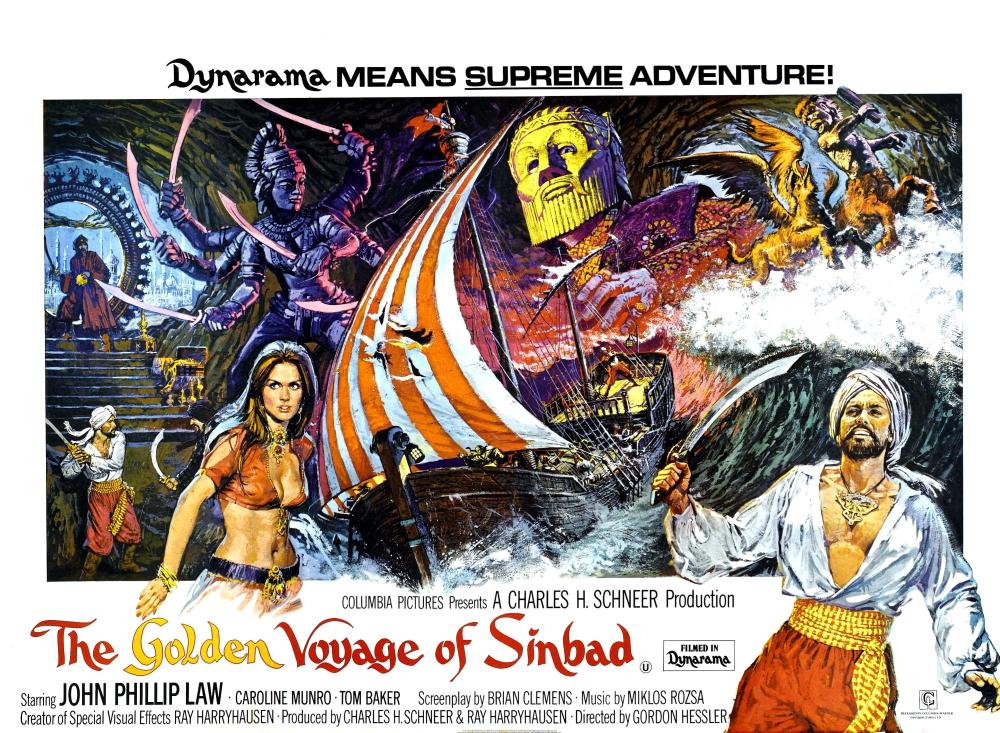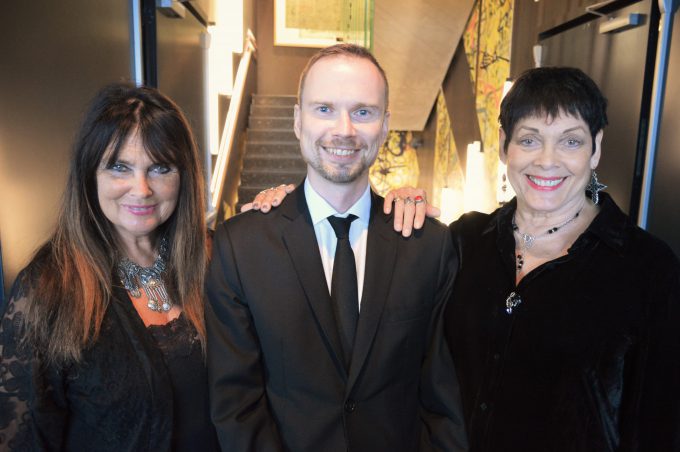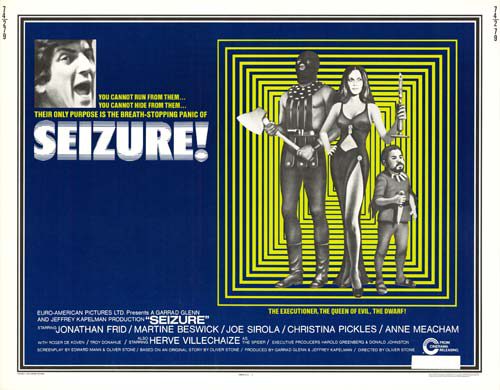On September 1, 2016, Bond•O•Rama.dk had the pleasure of sharing a table with legendary Bond girls Caroline Munro and Martine Beswick. This is the second half of our three-way conversation.
Caroline Munro (b. 1949) adorned the set of “James Bond 007 - Casino Royale” (1967) at the age of 16 as an uncredited "Guard Girl”. Ten years later, she made quite a sensation as Stromberg's scantily clad helicopter pilot Naomi in "The Spy Who Loved Me" (1977)
Martine Beswick (b. 1941) made her striking film debut as Zora, one of the fighting gypsy women in "From Russia with Love" (1963). The film's director, Terence Young, asked Beswick to return for "Thunderball" (1965), now in the role of Nassau agent and Bond ally Paula Caplan.
Bond•O•Rama met Caroline Munro, now 67 years old, and Martine Beswick, 75, at the design hotel The Thief in Oslo. Whereas the first part of the interview concerned the two cult actresses' roles in the James Bond 007 film series, this second part is devoted to their collaborations with Ray Harryhausen, Oliver Stone, Hervé Villechaize and notorious B-movie producers Menahem Golan & Yoram Globus among others.
● Read part one of the interview: Caroline Munro & Martine Beswick discuss their Bond girl experiences

BI: Brian Iskov/Bond•O•Rama.dk
CM: Caroline Munro
MB: Martine Beswick
Ray Harryhausen
BI: You both worked with Ray Harryhausen. And you, Caroline, are connected to the Ray & Diana Harryhausen Foundation as well?
CM: I was a trustee, and now I'm a ... they call me patron. Which sounds really well-put, but I quite like that.
MB: Yes, very grand. Because you are. Ha ha.
CM: I don't know about that. But I spread the word, and of course I was in "The Golden Voyage of Sinbad" (1973), and Martine was in "One Million Years B.C." (1966).
BI: What was that like?
CM: Oh, amazing.
MB: We loved him. I just thought he was fabulous and brilliant. Absolutely brilliant.
CM: So special ... and genius, really, at what he did. Willis O'Brien had started it with his "King Kong" (1933), but Ray kind of took it to another level and just went with it. He named it Dynarama, didn't he? [Dynamation, ed.] It was just so special, the process, and all the big ones ...
MB: ... acknowledge him for making it work, starting them, actually. [Steven] Spielberg ...
CM: Yes. He was sort of their person they look to, and they said, yep, we want to do that.
MB: He was the inspiration to a lot of these guys. I feel very privileged to have worked with him. Don't you?
CM: Me too, absolutely. We're very close with Vanessa, his daughter. She's lovely.
MB: She was on the cruise with us last year. Hi hi.
CM: She was! Yes, she and her husband. They're both farmers. He's a sheep farmer, Ray's son-in-law, and Vanessa is a farmer's wife now. A very selective one, but a farmer's wife.
BI: When you're acting in a Harryhausen film, are you just reacting to thin air?
CM: Yeah, pretty much.
MB: M-hm. As Caroline [says], it's his stick.
CM: He had his big old stick. Did he have a stick with you? Because you were going along in a ... thing, weren't you?
MB: He just used his hands. He was on a flatbed truck, and we were kind of following behind. And he would just do this [gesturing], so we were fighting ...
CM: Nothing, ha ha.
MB: His eyeline. That was the eyeline for us. And of course, there were moments when we were hysterical. Because here is this flatbed truck with this guy going like this, and we're going ... [raises hands in ”shock” posture].
CM: So were there any people standing by, watching? You know, ordinary people?
MB: Oh, no-no-no. Because we were in Lanzarote. Nobody there, miles off away from everyone. But it was just so ...
CM: Yeah. (clucks) "What are we doing?"
MB: And of course we were dressed in these ...
CM: Not much of anything.
MB: ... leather bits, and we're doing all of this with the sticks, and we have no idea what we are really doing, and suddenly, you sort of step outside of yourself, and you see this scene. And you'd just start to giggle! And in fact, we'd have to stop shooting because we'd be giggling so hard.
CM: I had a big old stick [to react to]. Also, what he did with us, with "Sinbad" which was very specific, he'd show us these wonderful pieces of artwork that he'd drawn, so I could see the centaur on his drawing. So it would kind of give you an idea of the size and the ... thing of him. And we saw him the other week, didn't we? We saw the centaur [stopmotion puppet]. He looked fabulous! I looked at bit rough. They had a little one of me, I though "ooooh".
MB: She was looking a little tatty.
CM: She looked a bit how I feel. I mean, her hair! Really. But he looked immaculate, the centaur.
BI: Where was that?
MB: We were in Manchester for a special festival, another festival, and it was sort of ...
CM: Sci-fi and ...
MB: Basically, a lot to do with Ray Harryhausen. Honoring his work. And they brought in ...
CM: ... things from the foundation. And they showed your film at night, late. Well, we didn't stay up for that.
MB: They showed yours, and they showed mine.
CM: We didn't see them.
MB: We left. (giggles) We took to the bed.
Oliver Stone & Hervé Villechaize
BI, to MB: You were in Oliver Stone's very first film, "Seizure". I'm curious, what was he like back then? He must have been very young, 27-28 years old.
MB: I can't remember how old he was, but he found me, because I was in Rome at the time, and he managed to find me through a friend of mine in Los Angeles, an agent friend of mine, and sent me the script. And when I read the script it freaked me out, because I was having nightmares from it. ... No, I started having nightmares before I got the script, and it freaked me out, because I was dreaming about the script. It was really weird. However, when I finally agreed to do it, and when I met him, I actually recognized genius. I mean, he tried to bury this film because he always thought it was sort of so beneath him. Especially with what came afterwards. But really, for a film with no money, absolutely no money, and everyone living in the house ... That was chaotic, ha!
CM: So you were actually living and shooting in the house? Claustrophobic.
MB: Oh, not only that, but the worst part is, you wake up with all the equipment still around you in the bedroom, right? And then, on top of which is that because it's not a sound studio, it means that nobody could go to the loo or walk around or do anything, because all the sound would pick up. So it was like really hard. But it was also very amusing and mad. And genius. He was really amazing. Unfortunately, I think that they should never have changed [the title]. The original title was "Queen of Evil".
BI: Referring to your character?
MB: Yeah. They should never have changed it.
CM: I'd love to see it. I know when we go to shows and people come up to you, and they love that film. I haven't seen it, and they say you were wonderful in that.
MB: Yeah, "Queen of Evil". And it's such a shame that he changed it to "Seizure", because it means ...
CM: Why "Seizure"?
MB: Oh, because the guy has a seizure. A heart attack, basically. It's a shame. But he's been trying to bury this for years, and it just won't go away!
CM: I do like his work. Were you happy with the results of "Seizure"?
MB: Ye-a-ah. It was really good, really interesting, given what we had, shooting. And the weirdness that were happening. I mean, it was like we were seeing ghosts. All the weird stuff in the script was actually weirding us out in the house.
CM: Sort of manifesting.
MB: Really weird, really weird. Every time we went to shoot in the attic, suddenly we had a hailstorm. And we couldn't shoot because of the sound. We'd go outside, and we were shooting, and suddenly all the cameras freeze. It was just like, "WHAT?"
CM: Yeah, that's a bit spooky, isn't it.
MB: But it was quite an experience, I have to tell you.
BI: Your co-star in "Seizure" was of course Hervé Villechaize [the diminituve Nick Nack in "The Man With the Golden Gun" (1974)].
MB: Hervé and Oliver became best friends.
CM: (delighted) Did they?
MB: When we went back to L.A., I'd have dinner parties, and they would come to the house, and the two of them would be dressed in velvet suits.
CM: Both of them? ”His and his”. Oh, sweet! That's strange.
MB: M-hm. And Hervé was a-ma-zing. He was really a connaisseur of all sorts of wines, he smoked fabulous cigars, he dressed really well, he was really intelligent. But he had a really bad time on the film, because he discovered that his regular size blonde wife had gone off with someone else.
CM: Oh no, during the filming? That's so sad.
MB: She was in Paris. And he ... went ... berserk. Absolutely berserk. Knives were being thrown, and ...
CM: Oh my God. Oh, poor chap. Scary! Oh dear.
MB: But we loved him. And of course, because he was little, and he was very naughty, he would come and sit in our laps.
CM: I can see his face now, even though I've never met him. Did he sit on your lap?
MB: (high-pitched) Yes!
CM: Was that odd or not really?
MB: No, because we allowed it. He did it with [co-star] Mary Woronov too. He would come and sit in our laps, and we would just hug, you know. Hi hi! And of course, he's a man! But there was something kind of odd about it.
CM: I bet he rather liked it, having a cuddle.
MB: Of course. He was odd about it also, because we knew it was kind of odd, so it was sort of ... playful. We knew. We understood. It was alright. But it was an amazing experience.
Golan & Globus
BI: Did you both work with Menahem Golan and Yoram Globus?
MB: (disgusted) Occchhh!
CM: I did too.
MB: Oh, what did you do?
CM: I did "The Black Cat" in Italy. And we were gonna do the sequel to "Starcrash". It was all announced and everything.
BI: Was "The Black Cat" the one where you didn't get paid?
CM: Yes, didn't get paid. Menahem, and Yoram ...
MB: Oh, they were just the most ...
CM: I didn't mind Menahem so much. Which was the ... There was the nephew, and Menahem was the director, wasn't he? He was actuallly alright-ish, but the other one was scary. I was terrified of him. Yoram.
MB: Menahem and Yoram. Let me tell you what they were, they were Mayhem and Urin, darling. That's what I call them.
CM: Oh yes. So what happened to you?
MB: I was so angry.
CM: You didn't get paid either? ICM couldn't get my money.
MB: No, no, I got paid, but they pulled some really nasty things. Like, you know, having ... like a pool scene at night. All of a sudden, I am waiting to shoot and discover that they've got all these extras in the pool, actually at it.
CM: Oh nooo! Which film?
MB: "The Happy Hooker Goes Hollywood" (1980). There were real people doing actual, you know, fornication.
CM: Oh, that was their film. So was he directing it, Menahem?
MB: No. I've forgotten his name [Alan Roberts, ed.], but basically he was being completely ...
CM: Oh no, that's horrible. You had no inkling? He didn't say, "Do you mind, we want it for realism"?
MB: No, no, no, no, no. That was not in it.
CM: That's very naughty, isn't it.
MB: It wasn't just naughty. I came out, and I was so angry. It's like four o'clock in the morning, I've been waiting to shoot forever. And I walked out, and ... In fact, I'd been waiting and said, "What is going on?". And so the assistant came to me and said, "Listen, you'd better come and take a look at what's happening". And I come out, it's like three o'clock in the morning, they're actually filming these people at it in the pool. And that's not in the script. It says it is, but no, it didn't need to be [explicit]. You know, it's easier to simulate, let's face it. And it was just awful, and I was so angry, I threatened to throw the camera in the pool, and I just went mad.
CM: Did they use the footage? Could you get it signed in your ...
MB: They complained and took me to SAG. And said that I had disrupted their filming. And I came back, and I said, "Excuse me. I'm going to tell you what they were doing."
CM: Good. So what happened?
MB: Well, of course, they just said, "Cut it off".
CM: They couldn't show it, that was it?
MB: I don't know what happened. I don't think they did. I have no idea. It was certainly not in the film as far as I know.
BI: A couple of years ago, when they found out that Mark Hartley was dong the documentary "Electric Boogaloo" [about them], they made their own documentary and released it, like, three months before.
CM: [incredulous] Did they?!
BI: Yeah, "The Go-Go Boys". Their own version.
CM: They're called "The Go-Go Boys"? Pfffff.
BI: But I believe one of them died shortly after that [Menahem Golan died August 2014, ed.].
CM: Maybe Menahem, the older one? He was quite a bit older.
MB: Or Yoram. They are some dreadful people. Absolutely dreadful men.
CM: They were scary, kind of like mafiosi types. You just knew there was something not quite right.
MB: M-hm. Sorry. They were really low. Dreadful people.
Favourites
BI: Do you have a favourite of your own films that's not a Bond film? Something you'd recommend?
MB: Do you have a favourite, darling?
CM: I don't know. I quite like "Captain Kronos [Vampire Hunter]" (1974). It's a Hammer. I loved "[The Golden Voyage of] Sinbad", because it was just a sweet, beautiful film, very pretty film.
MB: I like different things for different reasons, actually. I mean, "Thunderball", because it was the most fantastic, exquisite, delicious ... It was the height of Bond.
CM: It was the whole experience.
MB: Ah. The experience, two months in Nassau, which is absolutely fantastic.
CM: Oh, I can't imagine that.
MB: First class. So that was really great. I also loved doing "[Doctor] Jekyll and [Sister] Hyde" (1971). That was really interesting. Each one has a different ... I really, actually, liked playing the Happy Hooker, because I was the third one. The first one was Lynn Redgrave, the second one was Jody ... Oh God, what's her name? [Joey Heatherton, ed.] American, and she was also a dancer. She was "The Happy Hooker goes Washington", and then the third one was "The Happy Hooker Goes Hollywood".
CM: The lady was Xavier ...
MB: Xavier Hollander [US brothel madam whose autobiography inspired the movie series, ed.].
CM: Did you meet her?
MB: No, I did not.
CM: I just wondered if she'd be on the set.
MB: But I read a book, and she was something else.
CM: You didn't ever meet David Winters, did you?
MB: No. Who is he?
CM: He was an American producer, he worked a lot with Raquel Welch on all her specials. He was a dancer in "West Side Story" (1961), he was one of the Jets.
MB: I only knew Russ Tamblyn [Riff in "West Side Story", ed.].
CM: Ohhh. I bet he was lovely, wasn't he? Was he sweet?
MB: [chuckles warmly] I snagged him. He was fun. But he was an fantastic dancer, oh my God. He was old Hollywood fun.
CM: Is he around, still?
MB: Yeah, actually we did a film, a real piece of crap film, and I hadn't seen him in, I don't know, 15-20 years. And suddenly we arrive on the set ... What was the film called? Oh God, I can't even remember. ["Cyclone" from 1987, ed.] It was one of those really low-budget rubbish, and there was some amazing people. There was Russ, and there was Martin Landau, some major names in this rubbish film. And we were all boasting that we had all done the worst films. Our film were all the worst, of what we'd done.
CM: Like the Razzies.
MB: And it was just hilarious. Martin Landau, before he won his Oscar.
CM: He's a nice man.
MB: He was. Quite odd, though. He's quite an odd guy.
A very special thank you to Morten Steingrimsen and “James Bond in Oslo” for facilitating this interview.


